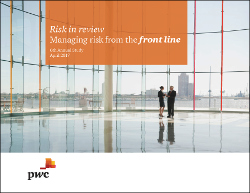Ungated Post | 20 Apr 2017
Risk in Review 2017: Managing risks from the first line

For the sixth year in a row, Oxford partnered on this flagship report, analyzing a survey of more than 1,500 corporate officers across 30 industries and 80 countries.
Faced with the new challenges of today’s complex business risk environment, companies are seeing the tide shifting back to the first line of defense. Today a collaborative approach to risk management with risk accountability sitting squarely in the first line of defense can be the key to greater organizational resiliency and growth. That means an engaged first line that makes risk decisions in alignment with strategy. It means a proactive second line that influences decision-making through timely consultation and collaboration. And it means a diligent, independent third line focused on its core missions of protecting the organization and delivering value.
Oxford Economics’ team is expert at applying advanced economic tools that provide valuable insights into today’s most pressing business, financial, and policy issues.
To find out more about our capabilities, contact:
Americas
Diantha Redd
+1 (646) 503 3052
Email
Asia Pacific
Peter Suomi
+65 6850 0110
Email
EMEA
Aoife Pearson
+44 (0)203 910 8054
Email
Related Services

Post
The economic impact of abandoning the WTO
Oxford Economics have been commissioned by the International Chamber of Commerce (ICC) to provide an independent assessment of the economic impact of WTO dissolution. This report details our findings and the assumptions underpinning our analysis.
Find Out More
Post
The economic impact of the sports activities of public service media
This study shows how the sports activities of public service media supported €4.5 billion of GDP and 57,000 jobs across 31 European countries in 2022. The report also highlights wider economic benefits of public service media sports coverage, such as the way in which it leverages sponsorship income for sports bodies.
Find Out More
Post
Global Trade Education: The role of private philanthropy
Global trade can amplify economic development and poverty alleviation. Capable leaders are required to put in place enabling conditions for trade, but currently these skills are underprovided in developing countries. For philanthropists, investing in trade leadership talent through graduate-level scholarships is an opportunity to make meaningful contributions that can multiply and sustain global economic development.
Find Out More